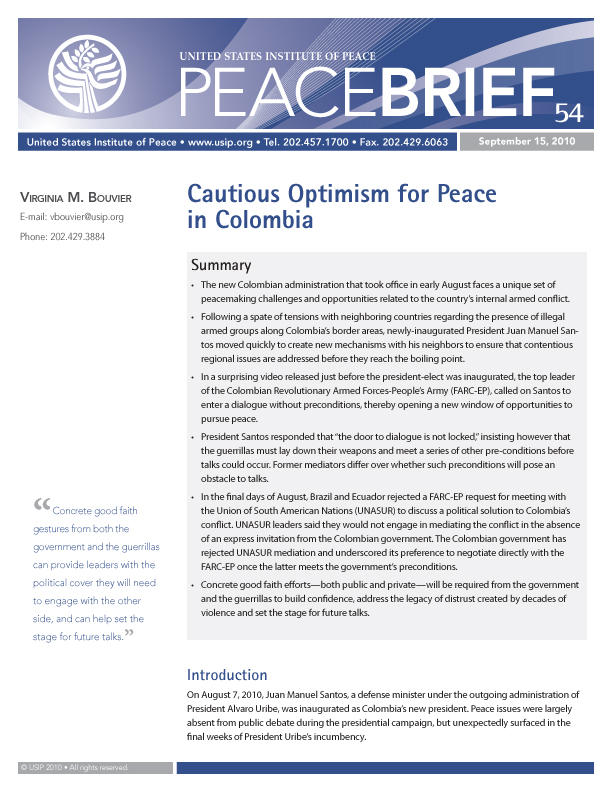On August 7, 2010, Juan Manuel Santos, a defense minister under the outgoing administration of President Alvaro Uribe, was inaugurated as Colombia’s new president. Peace issues were largely absent from public debate during the presidential campaign, but unexpectedly surfaced in the final weeks of President Uribe’s incumbency.

Summary
- The new Colombian administration that took office in early August faces a unique set of peacemaking challenges and opportunities related to the country’s internal armed conflict.
- Following a spate of tensions with neighboring countries regarding the presence of illegal armed groups along Colombia’s border areas, newly-inaugurated President Juan Manuel Santos moved quickly to create new mechanisms with his neighbors to ensure that contentious regional issues are addressed before they reach the boiling point.
- In a surprising video released just before the president-elect was inaugurated, the top leader of the Colombian Revolutionary Armed Forces-People’s Army (FARC-EP), called on Santos to enter a dialogue without preconditions, thereby opening a new window of opportunities to pursue peace.
- President Santos responded that “the door to dialogue is not locked,” insisting however that the guerrillas must lay down their weapons and meet a series of other pre-conditions before talks could occur. Former mediators differ over whether such preconditions will pose an obstacle to talks.
- In the final days of August, Brazil and Ecuador rejected a FARC-EP request for meeting with the Union of South American Nations (UNASUR) to discuss a political solution to Colombia’s conflict. UNASUR leaders said they would not engage in mediating the conflict in the absence of an express invitation from the Colombian government. The Colombian government has rejected UNASUR mediation and underscored its preference to negotiate directly with the FARC-EP once the latter meets the government’s preconditions.
- Concrete good faith efforts—both public and private—will be required from the government and the guerrillas to build confidence, address the legacy of distrust created by decades of violence and set the stage for future talks.
About This Brief
This brief was authored by Dr. Virginia M. Bouvier, senior program officer in the Center for Mediation and Conflict Resolution at USIP and author of "Colombia: Building Peace in a Time of War.” It is based on interviews she conducted during a visit to Colombia from July 28 through August 7, 2010.